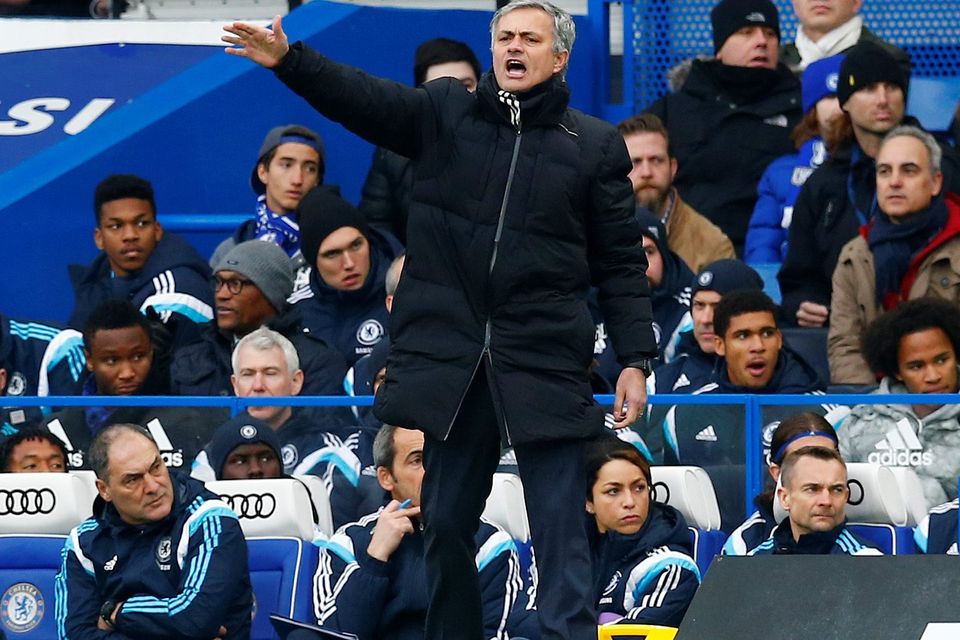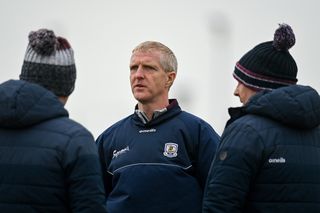Outrage plays into Mourinho's hands
Chelsea manager Jose Mourinho (Reuters / Eddie Keogh)
Bart: “Look at me! l’m over here! Turn this way right now”. Millhouse (as everyone in the school turns around to look at Bart): “Hey, it’s Bart! And he’s doing stuff!” Principal Skinner: “Bart, stop creating a diversion and get out of here.”
There is virtually no scenario in life that can’t be related back to a quote from The Simpsons and as Jose Mourinho – depending on the publication – hit back, lashed out, or became embroiled in a war of words with another batch of Sky Sports pundits, it was difficult not to think of him doing his best Bart Simpson impression.
In that episode, Bart is creating a diversion for his sister Lisa to switch another student’s work at a school exhibition and everyone in the school knows he’s doing it but yet they play along. It could, almost, be a Mourinho press conference after something has gone against his Chelsea team.
After being knocked out of the Champions League by Paris Saint-Germain, Mourinho was unusually magnanimous but, increasingly, those instant reactions seem to come around not because of his generosity to an opponent, but because he hasn’t quite worked out which way he wants to set the agenda.
By the time last Friday’s press conference arrived, the agenda wasn’t about why Chelsea conceded two goals from set-pieces or why they had been so negative against 10-men for 90 minutes or why Cesc Fabregas’s creativity has disappeared at the same time as Diego Costa has lost his European scoring boots.
BELIEF
Instead, it was Mourinho lashing out at Graeme Souness and Jamie Carragher for their belief that Chelsea had been more focussed on getting PSG players sent-off than trying to win the game.
When he returned to Chelsea last season, Mourinho claimed that he was now “The Happy One”.
But, just like that story about the Scorpion and the Frog told in The Crying Game, it is impossible for somebody to change the nature of their being. And when the pressure is on, that nature races to the surface.
Pressure, in Chelsea’s case, comes about every time they don’t get the result they want and, in virtually every case this season, Mourinho has had some comment which deflects attention away from some potential managerial shortcomings which may have been the reason behind them not picking up a victory.
It was a tactic used to quite brilliant effect by Alex Ferguson who could create a storm like accusing a referee of being unfit rather than wondering why his team needed an own goal to nick a late draw at home to Sunderland.
“It’s an indictment on our game,” added Ferguson in an almost identical manner in which Mourinho preaches concern for the game’s overall health when, in fact, he is only concerned with the state of himself.
Such concern for the purities of English football first appeared this season, unsurprisingly, after Chelsea had suffered their first defeat of the season against Newcastle in December, having previously only dropped points against Sunderland despite being the “only team trying to win the game”.
While there was damning with faint praise for Sunderland, Newcastle drew a different kind of begrudgery, this time for the ball-boys.
“We wanted to play more football, but it was not possible because of a few things I thought didn’t belong any more to top-level football, but still belong here,” he said.
“The ball disappeared, the ball doesn’t come, another ball comes, the ball boys run away. These kinds of situations that are, unfortunately, still part of the game. But no complaints.”
Apart, presumably, from the complaints he just mentioned.
The next time Chelsea dropped points, the post-match agenda wasn’t dominated by Southampton’s performance but by Mourinho’s claim that Cesc Fabregas not being awarded a penalty was “a scandal” before dropping in the notion of a “clear campaign” against his Chelsea team.
Even after a 5-3 defeat to Tottenham, it wasn’t a case of being beaten by a better team but lamenting how they might have won while also underlining the recently established “campaign”.
“We had the biggest opportunity to score the second goal which is a shot from the penalty spot,” said Mourinho after the defeat. “At 2-0 I don’t think they have a chance to change the game.”
When Burnley took points from them at Stamford Bridge, it wasn’t enough for Mourinho’s post-match interviews to focus on what was, admittedly, a disgraceful tackle on Nemaja Matic, he arranged to appear on Goals on Sunday to ensure that the Monday morning follow-ups to a Saturday game would be set on the agenda that he decided.
It’s far easier to complain about something rather than focus on why, as they did against both Burnley and PSG, they managed to concede a goal from a corner, moments after Thibault Courtois had made a magnificent save.
REGRESSION
If the concession of goals from set-pieces was a recurring theme of those games, so too was the dramatic regression into negativity which characterised their elimination against PSG and their failures to pick up maximum points on trips to Manchester City’s against 10 men and a drastically inferior Manchester United.
“When the game gets emotional, the numbers (of player on the pitch) are not important,” claimed Mourinho after the 1-1 draw against City but for a manager famed for factoring every possible scenario into his pre-match preparation, it must be a little disconcerting to witness such emotion from his players taking over from his instruction.
If Chelsea win the league without a hiccup, Mourinho will probably revert back to his Happy One, possibly even with a hug and a smile for Carragher and Souness to smooth things over.
If not, because he knows it plays right into his hands, there’ll be more incidents to create outrage and, just like Bart Simpson, deflect attention from where the real incident might be.
Bart: “Look at me! l’m over here! Turn this way right now!”. Millhouse (as everyone in the school turns around to look at Bart): “Hey, it’s Bart! -And he’s doing stuff!” Principal Skinner: “Bart, stop creating a diversion and get out of here!”
There is virtually no scenario in life that can’t be related back to a quote from The Simpsons and as Jose Mourinho – depending on the publication - hit back, lashed out, or became embroiled in a war of words with another batch of Sky Sports pundits, it was difficult not to think of him doing his best Bart Simpson impression.
In that episode, Bart is creating a diversion for his sister Lisa to switch another student’s work at a school exhibition and everyone in the school knows he’s doing it but yet they play along. It could, almost, be a Mourinho press conference after something has gone against his Chelsea team.
After being knocked out of the Champions League by Paris Saint-Germain, Mourinho was unusually magnanimous but, increasingly, those instant reactions seem to come around not because of his generosity to an opponent, but because he hasn’t quite worked out which way he wants to set the agenda.
By the time last Friday’s press conference arrived, the agenda wasn’t about why Chelsea conceded two goals from set-pieces or why they had been so negative against a team who had 10-men for 90 minutes or why Cesc Fabregas’s creativity has disappeared at the same time as Diego Costa has lost his European scoring boots.
Instead, it was Mourinho lashing out at Graeme Souness and Jamie Carragher for their belief that Chelsea had been more focussed on getting PSG players sent-off rather than trying to beat them on the scoreboard.
When he returned to Chelsea last season, Mourinho had claimed he was now “the Happy One” but, just like that story about the Scorpion and the Frog told in The Crying Game, it is impossible for somebody to change the nature of their being. And when the pressure is on, that nature races to the surface.
Pressure, in Chelsea’s case, comes about every time they don’t get the result they want and, in virtually every case this season, Mourinho has had some comment which deflects attention away from some potential managerial shortcomings which may have been the reason behind them not picking up a victory.
It was a tactic used to quite brilliant effect by Alex Ferguson who could create a storm about a random topic which nobody expected to be on the agenda when, in fact, there was a story in his team’s performance.
Why, in 2009 for example, would anybody want to analyse the reasons why Manchester United needed a last minute own goal to earn a point at home to Sunderland when they could, instead, focus on referee Alan Wiley’s physical condition thanks to Ferguson’s comments that he “wasn’t fit enough”.
“It’s an indictment on our game,” added Ferguson in an almost identical manner in which Mourinho preaches concern for the overall state of the game when, in fact, he is only concerned with the overall state of himself.
Such concern for the purities of English football first appeared this season, unsurprisingly, after Chelsea had suffered their first defeat of the season against Newcastle in December, having previously only dropped points against Sunderland despite being the “only team trying to win the game”.
While there was damning with faint praise for Sunderland, Newcastle drew a different kind of begrudgery, this time for the ball-boys.
“We wanted to play more football, but it was not possible because of a few things I thought didn’t belong any more to top-level football, but still belong here,” he said. “The ball disappeared, the ball doesn’t come, another ball comes, the ball boys run away. These kinds of situations that are, unfortunately, still part of the game. But no complaints.”
Apart, presumably, from the complaints he just mentioned.
The next time Chelsea dropped points, the post-match agenda wasn’t dominated by Southampton’s impressive performance but by Mourinho’s claim that Cesc Fabregas not being awarded a penalty was “a scandal” before dropping in the notion of a “clear campaign” against his Chelsea team.
Even after a 5-3 defeat to Tottenham in the following game, it wasn’t a case of being beaten by a better team but lamenting how they might have won while also underlining the recently established “campaign”.
“We had the biggest opportunity to score the second goal which is a shot from the penalty spot,” said Mourinho after the defeat. “At 2-0 I don’t think they have a chance to change the game.”
When Burnley took points from them at Stamford Bridge, it wasn’t enough for Mourinho’s immediate post-match interviews to focus on what was, admittedly, a disgraceful tackle on Nemaja Matic, he arranged to appear on Goals on Sunday to ensure that the Monday morning follow-ups to a Saturday game would be set on the agenda that he decided.
It’s far easier to complain about something rather than focus on why, as they did against both Burnley and PSG, they managed to concede a goal from a corner, moments after Thibault Courtois had made a magnificent save.
If the concession of goals from set-pieces was a recurring theme of those games, so too was the dramatic regression into negativity which characterised their elimination against PSG and their failures to pick up maximum points on trips to Manchester City’s against 10 men and a drastically inferior Manchester United.
“When the game gets emotional, the numbers (of player on the pitch) are not important,” claimed Mourinho after the 1-1 draw against City but for a manager famed for factoring every possible scenario into his pre-match preparation, it must be a little disconcerting to witness such emotion from his players taking over from his instruction.
If Chelsea win the league without a hiccup, Mourinho will probably revert back to his Happy One, possibly even with a hug and a smile for Carragher and Souness to smooth things over. If not, because he knows it plays right into his hands, there’ll be more incidents to create outrage and, just like Bart Simpson, deflect attention from where the real incident might be.















